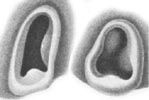Funnel–mantle locking apparatus
Appearance

The funnel–mantle locking apparatus is a structure found in many cephalopods that connects the mantle and hyponome (funnel) and restricts their movement relative to each other.[1] It consists of two interlocking components: one located on the mantle (often fibrous) and the other on the funnel (often cartilaginous).[1] The apparatus may permit some anterior–posterior displacement or prevent movement altogether.[1]
Function
[edit]This section needs expansion with: what does this cephalopod structure do? how does the animal use it?. You can help by adding to it. (June 2022) |
Variability
[edit]Funnel component
[edit]Six major forms of the funnel locking apparatus are recognised among teuthids (lazy-T shape, inverted-T shape, straight shape, triangular shape, oval with tragus and/or antitragus, and oval shape) and several more are found in the sepioids (including the boomerang shape and keyhole shape).[2]
| Shape of funnel locking apparatus | Species | Family |
|---|---|---|

|
Idioteuthis cordiformis | Mastigoteuthidae |

|
Magnapinna talismani | Magnapinnidae |

|
Mastigoteuthis flammea | Mastigoteuthidae |

|
Mastigoteuthis glaukopis | Mastigoteuthidae |

|
Mastigoteuthis grimaldii | Mastigoteuthidae |

|
Mastigoteuthis magna | Mastigoteuthidae |
Mantle component
[edit]| Shape of mantle locking apparatus | Species | Family |
|---|---|---|

|
Mastigoteuthis grimaldii | Mastigoteuthidae |
References
[edit]- ^ a b c Young, R.E., M. Vecchione & K.M. Mangold (1999). Cephalopoda Glossary. Tree of Life Web Project.
- ^ Young, R.E., M. Vecchione & K.M. Mangold (1997). Cephalopod Funnel Locking-Apparatus. Tree of Life Web Project.



